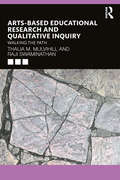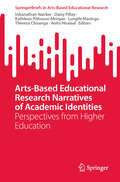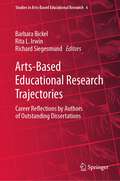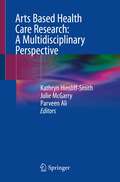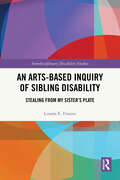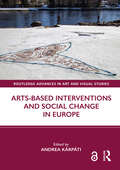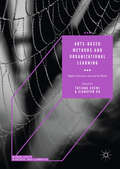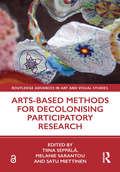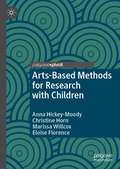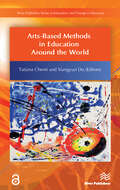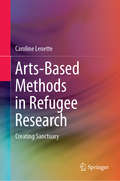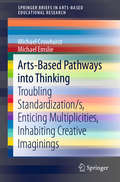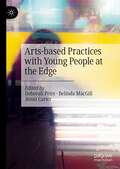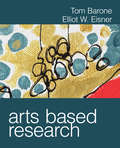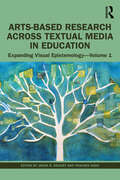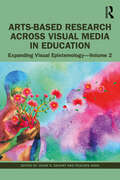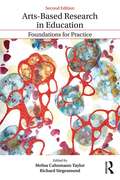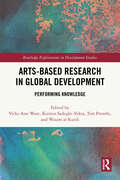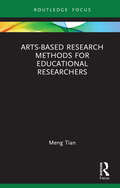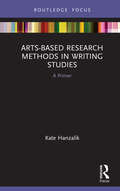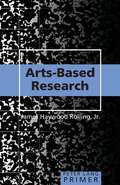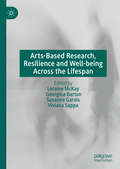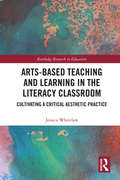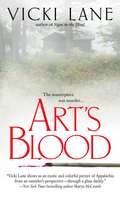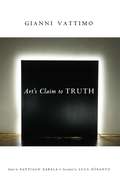- Table View
- List View
Arts-Based Educational Research and Qualitative Inquiry: Walking the Path
by Thalia M. Mulvihill Raji SwaminathanArts-Based Educational Research and Qualitative Inquiry introduces novice qualitative researchers, within education and related fields, to arts-based educational research (ABER). Abundant prompts and exercises are provided to help readers apply the concepts and experiment with various applications of the ideas presented. The authors walk the path with novice researchers offering a variety of approaches to the practice of arts-based methods, while providing a guided overview of ABER, and include pedagogical features in each chapter. Exercises are designed to assist educational researchers who wish to expand their repertoire of methodologies. The authors also weave into the discussion the possibilities and limitations of many types of arts-based methods while introducing readers to the growing methodological literature. By offering a tapestry of ways to engage the novice researcher, the book illustrates that it is not always possible to separate cognitive findings from aesthetic knowing. This book will help qualitative researchers to expand their methodologies to include arts-based approaches to their projects and by doing so reshape their identities as qualitative researchers. It also offers some evaluative criteria and tool kits for experimenting with various arts and educational research.
Arts-Based Educational Research Narratives of Academic Identities: Perspectives from Higher Education (SpringerBriefs in Arts-Based Educational Research)
by Inbanathan Naicker Daisy Pillay Kathleen Pithouse-Morgan Lungile Masinga Theresa Chisanga Anita HiralaalThis book delves into the complexities of being and becoming an academic in higher education. Inspired by the arts, the book introduces new voices and insights to scholarly discussions about what constitutes data and analysis in higher education research. It demonstrates ABER’s ability to shape and critique academic identity narratives in response to pressing problems and dilemmas in higher education. The book includes exemplars from studies conducted primarily in South African contexts and led by South African researchers. It explores diverse modes, including collage, digital artwork, letter writing, metaphor, creative nonfiction, and theatre-making. Contributions from expert scholars in Canada and the USA supplement this research and show how it has been enriched by critical transcontinental conversations. The authors offer new perspectives on the entwined and complex relationship between the ABER, narratives, and identities.
Arts-Based Educational Research Trajectories: Career Reflections by Authors of Outstanding Dissertations (Studies in Arts-Based Educational Research #6)
by Barbara Bickel Rita L. Irwin Richard SiegesmundThis book offers reflections from Arts-Based Educational Research (ABER) scholars who, since 2005, were awarded the American Educational Research Association ABER Special Interest Group's Outstanding Dissertation Award. The book includes essays from ten awardees who, across diverse artistic disciplines, share how their ABER careers evolve and succeed—inspiring insights into the possibilities of ABER. It also examines the essential role of mentorship in the academy that supports and expands ABER scholarship. Drawing from dissertation exemplars in the field, this book allows readers to look at how ABER scholars learn with the world while creatively researching and teaching in innovative ways
Arts Based Health Care Research: A Multidisciplinary Perspective
by Kathryn Hinsliff-Smith Julie McGarry Parveen AliThis book, written by academics across a range of disciplines, including healthcare and social sciences discusses the increasing use of the arts in healthcare research, which often stems from the recognition that for some topics of investigation, or when dealing with sensitive issues, the usual qualitative or quantitative paradigms are not appropriate. While there is undoubtedly a place for such approaches, arts-based research paradigms (ABR) offers, not only additional study and data-collection tools, but also provides a new and enjoyable experience for those involved. The use of the arts as a medium to improve health and wellbeing was well documented by the World Health Organisation (WHO) in 2019, with over 3,000 studies conducted around the globe on the value of the arts in the prevention of ill health and promotion of health across the life span. This book examines how the arts, in a variety of forms, can be used by those working directly in healthcare settings as well as those involved in research across all health or patient settings. Covering a range of ABR genres, including literature (such as narrative and poetic inquiry); performance (music, dance, play building); visual arts (drawing and painting, collage, installation art, comics); and audio-visual and multimethod approaches, this user- friendly book will appeal to nurses, researchers in nursing and allied healthcare professions, as well professionals in the social sciences, psychosociology, psychology, literature and arts.
An Arts-Based Inquiry of Sibling Disability: Stealing from My Sister’s Plate (Interdisciplinary Disability Studies)
by Linnéa E. FranitsThis book examines texts and other artistic products rendered by siblings of individuals with disabilities in order to interrogate the impact of disability on the identity of non-disabled siblings. This includes an arts-based analysis of the author’s own experiences as the sister of a woman with disabilities as depicted in photo essays and autoethnographic texts. By providing an alternate presentation of the topics surrounding sibling disability it gives readers a deeper and broader perspective of the lived experience of sibling disability by introducing them to some of the knowledge that is specifically, and perhaps singularly available to siblings of people with disabilities. Presenting findings from narrative analysis, visual analysis, autoethnographic and arts-based research related to sibling disability, it challenges the grand narratives that persist in many cultural products and medical discourses around sibling disability.It will be of interest to all scholars and students of disability studies, sociology, childhood studies, family studies and the arts more broadly.
Arts-Based Interventions and Social Change in Europe (Routledge Advances in Art and Visual Studies)
by Andrea KárpátiThis book presents 23 successful arts-based efforts to respond to social problems experienced by disadvantaged communities. The arts are a powerful means of fighting discrimination, marginalisation, neglect and even poverty. The educational programmes described in these chapters help stakeholders find solutions which are research-based, adaptable, repeatable and sustainable. Social problems that are addressed in this book include children living with physical challenges; suffering from financial and educational poverty; elderly women suffering from solitude; migrants facing a strange and not always welcoming cultural context; Roma youth fighting negative stereotypes and many more. Revealing the interconnectedness between social, economic and cultural exclusion, contributors planned interventions to develop skills, strengthen identities and build communities. This book will be of interest to scholars working in the visual arts, art education, design education, drama and theatre education and museum pedagogy. The Open Access version of this book, available at http://www.taylorfrancis.com, has been made available under a Creative Commons [Attribution-Non Commercial-No Derivatives (CC-BY-NC-ND)] 4.0 license.
Arts-based Methods and Organizational Learning: Higher Education Around the World (Palgrave Studies in Business, Arts and Humanities)
by Tatiana Chemi Xiangyun DuThis thematic volume explores the relationship between the arts and learning in various educational contexts and across cultures, but with a focus on higher education and organizational learning. Arts-based interventions are at the heart of this volume, which addresses how they are conceived, designed, carried out, and assessed in different higher educational and cultural contexts. Readers will discover diverse perspectives of the contributing authors from across the world and from a variety of settings: formal education, informal learning for adults and organisational learning. A necessary introductory conceptualisation sets the stage for the discussion of the different cases, with chapters presented according to the art forms the address: performing arts, dance, music, language arts, visual arts, multi-arts and a conclusive chapter on future perspectives for arts-based educational approaches. Arts-based Methods and Organisational Learning: Higher Education Around the World will inspire and inform both scholars and practitioners who are dealing with the arts in education and organisations.
Arts-Based Methods for Decolonising Participatory Research (Routledge Advances in Art and Visual Studies)
by Tiina Seppälä; Melanie Sarantou; Satu MiettinenIn an effort to challenge the ways in which colonial power relations and Eurocentric knowledges are reproduced in participatory research, this book explores whether and how it is possible to use arts-based methods for creating more horizontal and democratic research practices. In discussing both the transformative potential and limitations of arts-based methods, the book asks: What can arts-based methods contribute to decolonising participatory research and its processes and practices? The book takes part in ongoing debates related to the need to decolonise research, and investigates practical contributions of arts-based methods in the practice-led research domain. Further, it discusses the role of artistic research in depth, locating it in a decolonising context. The book will be of interest to scholars working in art history, design, fine arts, service design, social sciences and development studies.
Arts-Based Methods for Research with Children (Studies in Childhood and Youth)
by Anna Hickey-Moody Christine Horn Marissa Willcox Eloise FlorenceThis book offers a practical, methodological guide to conducting arts-based research with children by drawing on five years of the authors’ experience carrying out arts-based research with children in Australia and the UK. Based on the Australian Research Council-funded Interfaith Childhoods project, the authors describe methods of engaging communities and making data with children that foreground children’s experiences and worldviews through making, being with, and viewing art. Framing these methods of doing, seeing, being, and believing through art as modes of understanding children’s strategies for negotiating personal identities and values, this book explores the value of arts-based research as a means of obtaining complex information about children’s life worlds that can be difficult to express verbally.
Arts-Based Methods in Education Around the World: Higher Education Around The World (River Publishers Series In Innovation And Change In Education Ser.)
by Tatiana Chemi Xiangyun DuArts-Based Methods in Education Around the World aims to investigate arts-based encounters in educational settings in response to a global need for studies that connect the cultural, inter-cultural, cross-cultural, and global elements of arts-based methods in education. In this extraordinary collection, contributions are collected from experts all over the world and involve a multiplicity of arts genres and traditions. These contributions bring together diverse cultural and educational perspectives and include a large variety of artistic genres and research methodologies.The topics covered in the book range from policies to pedagogies, from social impact to philosophical conceptualisations. They are informative on specific topics, but also offer a clear monitoring of the ways in which the general attention to the arts in education evolves through time.
Arts-Based Methods in Refugee Research: Creating Sanctuary
by Caroline LenetteDrawn from a decade of refugee studies, this book offers a wealth of insights on arts-based methodologies. It explores exciting new prospects for participatory and culturally safe research, and will be a reference resource for researchers of all levels and community practitioners.The book tackles questions of meaningful research practice: How do people with lived experiences of forced migration—Knowledge Holders—lead the way? Can arts-based methods bring about policy and social change? And what of ethical issues?By reflecting on the strengths and limitations of four research methods (digital storytelling, photography, community music, and participatory video), readers are invited to craft their own approach to arts-based projects.
Arts-Based Pathways into Thinking: Troubling Standardization/s, Enticing Multiplicities, Inhabiting Creative Imaginings (SpringerBriefs in Arts-Based Educational Research)
by Michael Crowhurst Michael EmslieThis book, based on a critical/collective/auto/ethnographic research project, describes an assemblage of theoretically informed, arts-based methods that aim to promote multiplicity and thinking. It explores multiplicities of knowing, sensing, doing and being, generated by analyzing knowing frames, poetry, reading aloud, fableing, playwriting and other inventive, playful and scholarly ways of working with experiences and stories. By offering engaging and inspiring strategies that can disturb standardizations and interrupt cultural normativities, the book sheds light on the conditions that might be present in cultural contexts that enable diversity and creativity. The research project on which this book is based originated from a contradictory set of conditions characterized on the one hand by a marked interest in creative research methods and novel knowledge practices and, on the other hand, by a widespread concern that we live in increasingly standardized times, featuring systems that specify objectives ahead of time, demand compliance and narrow the possibilities for human action. The book takes readers on an arts-based journey designed to enhance the opportunities for imaginative and ethical professional practice in education, human services and the arts.
Arts-based Practices with Young People at the Edge
by Deborah Price Belinda MacGill Jenni CarterThis book explores how arts-based programs designed to reconnect young people with learning and work provide brief, sometimes profound, re-engagements and productive identity shifts. It aims to support youth pushed to the edge of formal education and entangled in structural social and cultural inequality. The researchers, artists, activists, and youth organizations developed process-oriented practices with young people, enacting new creative methodologies building on agentive possibilities to disrupt misrepresentation and invisibility. The book positions arts-based practices at the edge, examining complex systemic issues around youth disengagement and possibilities of collective creativity to navigate broken systems and inform futures. Enacting arts-based methodologies with young people at the edge through co-design shares navigation out of locked trajectories in collaboration with those who listen deeply as allies in their journey of re-presenting themselves to the world. The final section reflects on arts-based practices at the edge eliciting standpoints of young people at the edge.https://link.springer.com/
Arts Based Research
by Elliot W. Eisner Tom BaroneArts Based Research is ideal for students, researchers, and practitioners. This unique book provides a framework for broadening the domain of qualitative inquiry in the social sciences by incorporating the arts as a means of better understanding and rethinking important social issues. In the book′s 10 thought-provoking chapters, authors Tom Barone and Elliot W. Eisner--pioneers in the field--address key aspects of arts based research, including its purpose and fundamental ideas, controversies that surround the field and the politics and ethics involved, and key criteria for evaluation.
Arts-Based Research Across Textual Media in Education: Expanding Visual Epistemology - Volume 1
by Jason D. DeHart Peaches HashIn company with its sister volume, Arts-Based Research Across Textual Media in Education explores arts-based approaches to research across media, including film and comics-related material, from a variety of geographic locations and across a range of subdisciplines within the field of education. This first volume takes a textual focus, capturing process, poetic, and dramaturgical approaches. The authors aim to highlight some of the approaches that are not always centered in arts-based research. The contributors represent a variety of arts-based practices and methods, and they weave this marrying of artistic and scientific expertise and experience into the fabric of the chapters themselves. Authors from international contexts speak to the importance of utilizing artistic approaches for research processes. From multimodal field notes to poetic forms to the dramaturgical, chapters in this book represent steps forward in educational inquiry to bringing together both the creative and credible. The book includes multiple images and rich descriptions shared from the field. This first volume covers amongst other topics: co-created narratives, creative fiction in research, analytic portraits, dramatic representation, and critical poetic inquiry. It would be suitable for graduate students and scholars interested in qualitative inquiry and arts-based methods, in education and the social sciences.
Arts-Based Research Across Visual Media in Education: Expanding Visual Epistemology - Volume 2
by Jason DeHart Peaches HashIn company with its sister volume, this book explores arts-based approaches to research across media, including film and comics-related material, from a variety of geographic locations and across a range of subdisciplines within the field of education. This second volume has a focus exclusively on visual output and image-based research and methods. The book aims to highlight some of the approaches that are not always centered in arts-based research. The visual takes center stage as authors lead with comics-based representations, among other forms of arts-based inquiry. These chapters follow on from the first collection and serve to expand thinking about merging creative methods with analysis and exploration in the world of education. From mixtapes to the curatorial, these chapters showcase the ways in which scholars explore the multitude of human experiences. This second volume covers, among other topics: comics in qualitative research, visual journaling, multimodal fieldnotes and discourse, and creative visual outputs. It is suitable reading for graduate students and scholars interested in qualitative inquiry and arts-based methods, in education and the social sciences.
Arts-Based Research in Education: Foundations for Practice (Inquiry And Pedagogy Across Diverse Contexts Ser.)
by Melisa Cahnmann-Taylor Richard SiegesmundPresenting readers with definitions and examples of arts-based educational research, this text identifies tensions, questions, and models in the field and provides guidance for both beginning and more experienced practice. As arts-based research grows in prominence and popularity across education and the social sciences, the barriers between empirical, institutional, and artistic research diminish and new opportunities emerge for discussion, consideration, and reflection. This book responds to an ever increasing, global need to understand and navigate this evolving domain of research. Featuring a diverse range of contributors, this text weaves together critical essays about arts-based research in the literary, visual, and performing arts with examples of excellence in theory and practice. New to the Second Edition: Additional focus on the historical and theoretical foundations of arts-based educational research to guide readers through development of the field since its inception. New voices and chapters on a variety of artistic genres, including established and emerging social science researchers and artists who act, sing, draw, and narrate findings. Extends and refines the concept of scholartistry, introduced in the first edition, to interrogate excellence in educational inquiry and artistic processes and products. Integrates and applies theoretical frameworks such as sociocultural theory, new materialsm, and critical pedagogy to create interdisciplinary connections. Expanded toolkit for scholartists to inspire creativity, questioning, and risk-taking in research and the arts.
Arts-based Research in Global Development: Performing Knowledge (Routledge Explorations in Development Studies)
by Vicki-Ann Ware Kirsten Sadeghi-Yekta Tim Prentki Wasim Al KurdiThis book brings together a range of arts and development scholars and practitioners to explore the unique ways in which arts-based research methods can make a unique positive contribution to effective global development practice.Since the 1970s, global development has witnessed an increase in the use of participatory approaches to enable the world’s most excluded peoples to be actively involved in the planning and implementation of development projects that impact them. A range of participatory practices are now in common use, many of which use visual activities which enable fuller participation irrespective of literacy levels or social position. More recently, development practitioners with arts skills, along with a small number of professionally trained artists, have started engaging in a wider range of arts-based practices within this participatory development space, aimed at co-creating new knowledge with these communities. This book explores how the performing and visual arts provide spaces for the world’s most marginalised communities to articulate their development aspirations and co-create knowledge that contributes to development outcomes. It also highlights how arts-based research puts the power over development decisions back into the hands of ‘recipient’ communities.The book will be of interest to development practitioners and artists working with marginalised communities globally, policymakers in arts and global development, graduate students, and academics. The rich case studies provide many fresh ideas for arts and/or development practitioners wanting to utilise arts-based research, particularly with performing arts, in global development programming.
Arts-based Research Methods for Educational Researchers (Qualitative and Visual Methodologies in Educational Research)
by Meng TianArts-Based Research Methods for Educational Researchers is a book for early-career and established scholars who aim to use the arts to spark new ideas and empower participants in educational research. It will allow readers to conduct arts-based research and phenomenography research in their own projects.The book starts with a brief history of the arts in research, going on to provide an in-depth understanding of the philosophical foundations of arts-based research — different research designs, material preparation, ethical considerations, data collection, analysis and reporting. Chapters highlight the impact of arts-based research, how it can be used to facilitate positive changes in educational research, practice, and policymaking. Tian suggests avenues for those who want to further develop these methods, guiding readers to reflect on their positionality and ethical issues involved in the research process. This insightful book is ideal for early career and experienced educational researchers who use qualitative methods in their inquiries. It offers a reader-friendly guide to methodology for scholars, educators as well as undergraduate and postgraduate students.
Arts-Based Research Methods in Writing Studies: A Primer (Routledge Research in Writing Studies)
by Kate HanzalikAs the arts become an increasingly popular pedagogical tool in writing studies, Arts-Based Research Methods in Writing Studies offers scholars and educators in the field ways to leverage the arts for their own scholarship through the practice of arts-based research (ABR). Tailored to the needs of writing studies scholars, this concise guide presents ways of exploring and addressing unresolved research questions from the past as well as new, pressing questions that are emerging in light of increasingly fraught and complicated current contexts. It explores motives and methods for taking up ABR, sheds light on the processes of representing research and the ethical imperative of methodological disclosure, and looks critically at the complexities of fully realizing ABR in writing studies while offering some pedagogical applications. Connecting theory to practice, this book also performs ABR through a co-created mixed-media text about the everyday and extraordinary stories woven into the fabric of new American artists’ composing processes. Arts-Based Research Methods in Writing Studies lends itself to insight that is at once personal for writing studies researchers, useful for research communities, and a catalyst for social change beyond institutional walls; as such, it will be an important resource for scholars, educators, and graduate students in writing studies and those interested in multimodal, multilingual, and translingual learning; equitable pedagogies and administrative practices; online writing instruction; transnational literacies; research methods; community-based research; and disability studies in composition.
Arts-Based Research Primer (Peter Lang Primer #36)
by James Haywood Rolling<p>The Arts-Based Research Primer explores the arts-based research paradigm and its potential to intersect with and augment traditional social science and educational research methods. The arts-based research (ABR) paradigm may be broadly understood as a flexible architecture of practice-based theory-building methodologies. This text aims to reveal how arts-based ways of knowing and doing lend themselves to blended spaces of naturalistic inquiry, and is intended to aid artists and scientists alike in their research and professional practices. <p>This text also highlights the utility of arts-based research concepts toward building innovative curriculum-making strategies for educational practice both within and beyond the classroom setting. Accessible examples of analytic, synthetic, critical-activist, and improvisational arts-based research methodologies and their outcomes were solicited from a wide range of researchers in varying disciplines, including senior faculty and emerging graduate level scholars. Chapters include a paradigm analysis of the characteristics of arts-based research; brief historical overviews along with a review of recent ABR literature; charts, diagrams and photographs representing ABR approaches for addressing diverse kinds of questions; suggestions for using an ABR inquiry model when writing a research paper; and detailed glossaries of key concepts and terms.</p>
Arts-Based Research, Resilience and Well-being Across the Lifespan
by Susanne Garvis Georgina Barton Loraine McKay Viviana SappaThis book investigates how arts-based research methods can positively influence people’s resilience and well-being, particularly in constraining environments. Using examples from arts-based research methods in different contexts and from across the globe, the book brings together a diverse range of perspectives to understand how both resilience and well-being can be supported in a world that is rarely stress free. Collectively they demonstrate how arts-based research methods can: provide agency through the foregrounding of participants’ voices; afford transformational learning opportunities; create opportunities for relationship building; support creativity and new ways of thinking; generate aspirations and hope; encourage forms of communication that expose ideas, emotions and feelings that previously might not have been known or known how to be expressed; and enhance reflection and reflexivity. The authors explore how art-based practices, such as clowning, collage, dramatisation, drawing, painting, role-play and sculpting, can be used to support the resilience and well-being of individuals and groups across the lifespan, and theorize how arts-based research methods can positively contribute to participants’ positive self-esteem, self-image and ability to cope with challenges and new circumstances. Academics, professional learning facilitators, higher education students, and anyone interested in resilience and well-being in the health and education sectors will find this an interesting and engaging text.
Arts-Based Teaching and Learning in the Literacy Classroom: Cultivating a Critical Aesthetic Practice (Routledge Research in Education)
by Jessica WhitelawThis book highlights the unique and co-generative intersections of the arts and literacy that promote critical and socially engaged teaching and learning. Based on a year-long ethnography with two literacy teachers and their students in an arts-based public high school, this volume makes an argument for arts-based education as the cultivation of a critical aesthetic practice in the literacy classroom. Through rich example and analysis, it shows how, over time, this practice alters the in-school learning space in significant ways by making it more constructivist, more critical, and fundamentally more relational.
Art's Blood (The Elizabeth Goodweather Appalachian Mysteries #2)
by Vicki LaneNorth Carolina’s hills are a crazy quilt of old farmsteads and new beginnings, of locals, strangers, artists, and new age wanderers….Here Elizabeth Goodweather has made her life, a still-young widow who moves easily between the gentrified world of Asheville and old-timers in their hollows. But when a flamboyant performance artist is murdered, and Elizabeth learns the amazing history of a magnificent piece of folk art, she gets caught between her two worlds–and in the middle of an agonizing mystery.A young woman, taking her artwork to the breaking point, has brought a history of unexplained deaths and dangerous liaisons into Elizabeth’s life. Courted by an ex-cop, trying to protect her love-struck nephew, Elizabeth knows that danger has entered her peaceful world. But she can’t guess how deadly the threat is–nor how masterfully a killer can hide....From the Paperback edition.
Art’s Claim to Truth (Columbia Themes in Philosophy, Social Criticism, and the Arts)
by Gianni VattimoFirst collected in Italy in 1985, Art's Claim to Truth is considered by many philosophers to be one of Gianni Vattimo's most important works. Newly revised for English readers, the book begins with a challenge to Plato, Aristotle, Kant, and Hegel, who viewed art as a metaphysical aspect of reality rather than a futuristic anticipation of it. Following Martin Heidegger's interpretation of the history of philosophy, Vattimo outlines the existential ontological conditions of aesthetics, paying particular attention to the works of Kandinsky, which reaffirm the ontological implications of art. <P><P>Vattimo then builds on Hans-Georg Gadamer's theory of aesthetics and provides an alternative to a rationalistic-positivistic criticism of art. This is the heart of Vattimo's argument, and with it he demonstrates how hermeneutical philosophy reaffirms art's ontological status and makes clear the importance of hermeneutics for aesthetic studies. In the book's final section, Vattimo articulates the consequences of reclaiming the ontological status of aesthetics without its metaphysical implications, holding Aristotle's concept of beauty responsible for the dissolution of metaphysics itself. In its direct engagement with the works of Gadamer, Heidegger, and Luigi Pareyson, Art's Claim to Truth offers a better understanding of the work of Vattimo and a deeper knowledge of ontology, hermeneutics, and the philosophical examination of truth.
